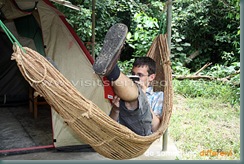Every time I head up country, the same thought inevitably occupies my mind for most of the journey. There’s just so much unused land up country but yet it feels like 40% of the population resides in Freetown. There’s something very wrong with our land laws.
Nevertheless, heading up country is always an adventure, especially when you’re heading somewhere for the first time. This would be my first trip to Gola, Bonthe and Turtle Islands. Ok, I’m not going to lie, I was looking forward to the Turtle Islands the most, followed closely by Bonthe. We also visited Tiwai and spent one night in Bo, but these areas I’d seen before. 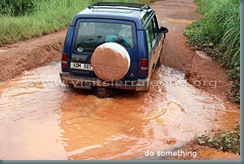 I know what those up country roads will do to a vehicle, so I said my prayers because breaking down in the middle of the bush is not something I’d particularly consider fun.
I know what those up country roads will do to a vehicle, so I said my prayers because breaking down in the middle of the bush is not something I’d particularly consider fun.
Day 1 – Gola Forest Reserve
We decided to head to Gola directly from Freetown. Some had suggested staying the night at Kenema but because of limited time we figured we could probably do it in a day. In total the trip took nearly 12 hours though we did stop at the Gola Rainforest  Programme Office in Kenema to pick up a guide, briefing and also lunch at the SLRA canteen in Kenema. I like Kenema, something about the tow n’s layout appeals to me. It doesn’t feel as compressed as Bo though it’s probably not as much fun either.
Programme Office in Kenema to pick up a guide, briefing and also lunch at the SLRA canteen in Kenema. I like Kenema, something about the tow n’s layout appeals to me. It doesn’t feel as compressed as Bo though it’s probably not as much fun either. 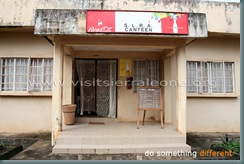 We picked up our guide and continued on our journey. Kenema to the Gola Rainforest (SLETI/Zimmi end) took longer than I anticipated. We got to Gola Rainforest after dark and the first mission was to go get the dinner of potato leaves prepared by folks from the nearby village.
We picked up our guide and continued on our journey. Kenema to the Gola Rainforest (SLETI/Zimmi end) took longer than I anticipated. We got to Gola Rainforest after dark and the first mission was to go get the dinner of potato leaves prepared by folks from the nearby village. 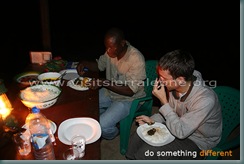 We ate settled into candle-lit dinner washed down with some Heineken, water and vodka depending on your like. The night was passed in the building normally reserved for researchers and the like. You have that ‘middle of nowhere’ feeling at this spot. The night was blessed with all sorts of exotic sounds from the forest while fireflies showed off their lighting abilities, adding beauty to the night.
We ate settled into candle-lit dinner washed down with some Heineken, water and vodka depending on your like. The night was passed in the building normally reserved for researchers and the like. You have that ‘middle of nowhere’ feeling at this spot. The night was blessed with all sorts of exotic sounds from the forest while fireflies showed off their lighting abilities, adding beauty to the night.
In the morning you see you’re surrounded by forest but you probably don’t realise the vastness of the forest around you. 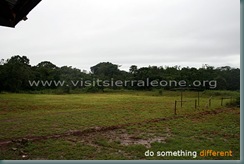 The three forest reserves, which comprise Gola Forest (Gola North, 45,800 ha; Gola East 22,800 ha; Gola West 6,200 ha), are located in the Eastern and Southern Provinces, about 330km southeast of Freetown. Gola forest covers parts of the Gaura, Tunkia, Nomo, and Koya Chiefdoms in the Kenema District; Barri and Makpele Chiefdoms in the Pujehun District; and Malema Chiefdom in the Kailahun District and also forms part of Sierra Leone's border with the Republic of Liberia. Small areas of forest remain outside the reserves and connect the reserves to each other and to forests in Liberia. It is the largest tract of closed canopy, lowland rain forest in Sierra Leone.
The three forest reserves, which comprise Gola Forest (Gola North, 45,800 ha; Gola East 22,800 ha; Gola West 6,200 ha), are located in the Eastern and Southern Provinces, about 330km southeast of Freetown. Gola forest covers parts of the Gaura, Tunkia, Nomo, and Koya Chiefdoms in the Kenema District; Barri and Makpele Chiefdoms in the Pujehun District; and Malema Chiefdom in the Kailahun District and also forms part of Sierra Leone's border with the Republic of Liberia. Small areas of forest remain outside the reserves and connect the reserves to each other and to forests in Liberia. It is the largest tract of closed canopy, lowland rain forest in Sierra Leone.
Our mission in the morning was a forest walk. You know, take some nice pictures of wildlife and maybe some birds. Well, it also decided to rain all morning (then again, it is a rainforest right?). The most we got to see were trees. Well, we did hear some birds and our guide from Freetown, Joseph always comes alive at the sound of birds. Quick to tell us what that was backed up with pointing it out in his ‘birds of West Africa’ book. We always knew this wasn’t the best time of the year to visit but this was when we could do it. So we walked down to the river and back up, totally drenched. 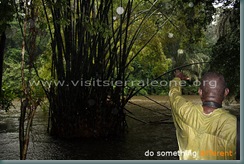 It was back to camp, where I had a shower (yes, they have running water which is just cool!) and time to get ready to head back out. Nevertheless, we enjoyed Gola. The folks on the programme were really serious about their work, our guide Alhaji obviously knew his stuff and it was great to have finally visited.
It was back to camp, where I had a shower (yes, they have running water which is just cool!) and time to get ready to head back out. Nevertheless, we enjoyed Gola. The folks on the programme were really serious about their work, our guide Alhaji obviously knew his stuff and it was great to have finally visited.
Day 2 – Gola to Bo
Bo was an overnighter. We were able to do the essentials… have wider choice of food, charge phones etc. Country Side Guesthouse was to be our home for the night. At this point, I heard from the office in town that Equatorial Guinea was coming to play the Leone Stars and require the same sort of service we offered to Bafana Bafana. I was going to miss that bit of fun.
Day 3 – Tiwai Island
Getting from Bo to Tiwai via Potoru was not difficult and the roads didn’t seem as bad. I was last in Tiwai in 2005 as part of that documentary we did for the BBC.  The boat ride from Kambama is only 10 minutes before setting foot in the island with dreams of seeing the elusive pygmy hippo. The Tiwai project has come some way since 2005. The biggest improvements are undoubtedly the solar power and also running water. I tell you folks, being able to take a shower in the middle of nowhere could be the difference between spending the evening on your hammock reading a book… and strangling someone. Ok, I exaggerate but you know what I mean.
The boat ride from Kambama is only 10 minutes before setting foot in the island with dreams of seeing the elusive pygmy hippo. The Tiwai project has come some way since 2005. The biggest improvements are undoubtedly the solar power and also running water. I tell you folks, being able to take a shower in the middle of nowhere could be the difference between spending the evening on your hammock reading a book… and strangling someone. Ok, I exaggerate but you know what I mean.
 Soon after arrival, we were joined by another group of about a dozen Chinese tourists/workers who had decided to come spend the afternoon probably a team building exercise or so. Apparently, they were the guys responsible for building a stadium around Bo. They seemed to have a great time, even though I couldn’t understand a word they were saying.
Soon after arrival, we were joined by another group of about a dozen Chinese tourists/workers who had decided to come spend the afternoon probably a team building exercise or so. Apparently, they were the guys responsible for building a stadium around Bo. They seemed to have a great time, even though I couldn’t understand a word they were saying.
 The first afternoon was spent was spent during the boat trip up the river. We saw mostly birds (you go Joseph!) but unfortunately no pygmy hippos. I’ve being told that would probably entail spending the night up a tree or something… and you’re still not guaranteed a sighting of this shy, elusive creatures but they do exist on the island!
The first afternoon was spent was spent during the boat trip up the river. We saw mostly birds (you go Joseph!) but unfortunately no pygmy hippos. I’ve being told that would probably entail spending the night up a tree or something… and you’re still not guaranteed a sighting of this shy, elusive creatures but they do exist on the island!
The island doesn’t have a dedicated restaurant but I understand this is in the plan for the not too distant future. 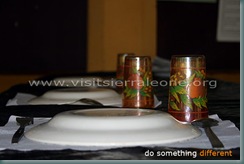 We had dinner of potatoes, rice and stew prepared for us in their outside kitchen by their chef. It was enough to get us through the night before embarking on the forest walk early in the morning.
We had dinner of potatoes, rice and stew prepared for us in their outside kitchen by their chef. It was enough to get us through the night before embarking on the forest walk early in the morning.
The walk in the morning was quite similar to the last time I was there (seem to have made it a habit of visiting off peak), we saw monkeys, Red Colobus, Diana Monkeys etc but I’m starting to think the wildlife in Sierra Leone are quite shy. This may be as a result of the war or hunting but I do think they hide when they see or hear the craziest, wildest animal of them all. Man.
 Tiwai is a community conservation programme, managed by the Tiwai Island Administrative Committee (TIAC), which represents both communities, government, Universities & conservation organizations. All funds raised go towards running the project as well as supporting the Community Development Fund, to help finance community initiated programmes.
Tiwai is a community conservation programme, managed by the Tiwai Island Administrative Committee (TIAC), which represents both communities, government, Universities & conservation organizations. All funds raised go towards running the project as well as supporting the Community Development Fund, to help finance community initiated programmes.
